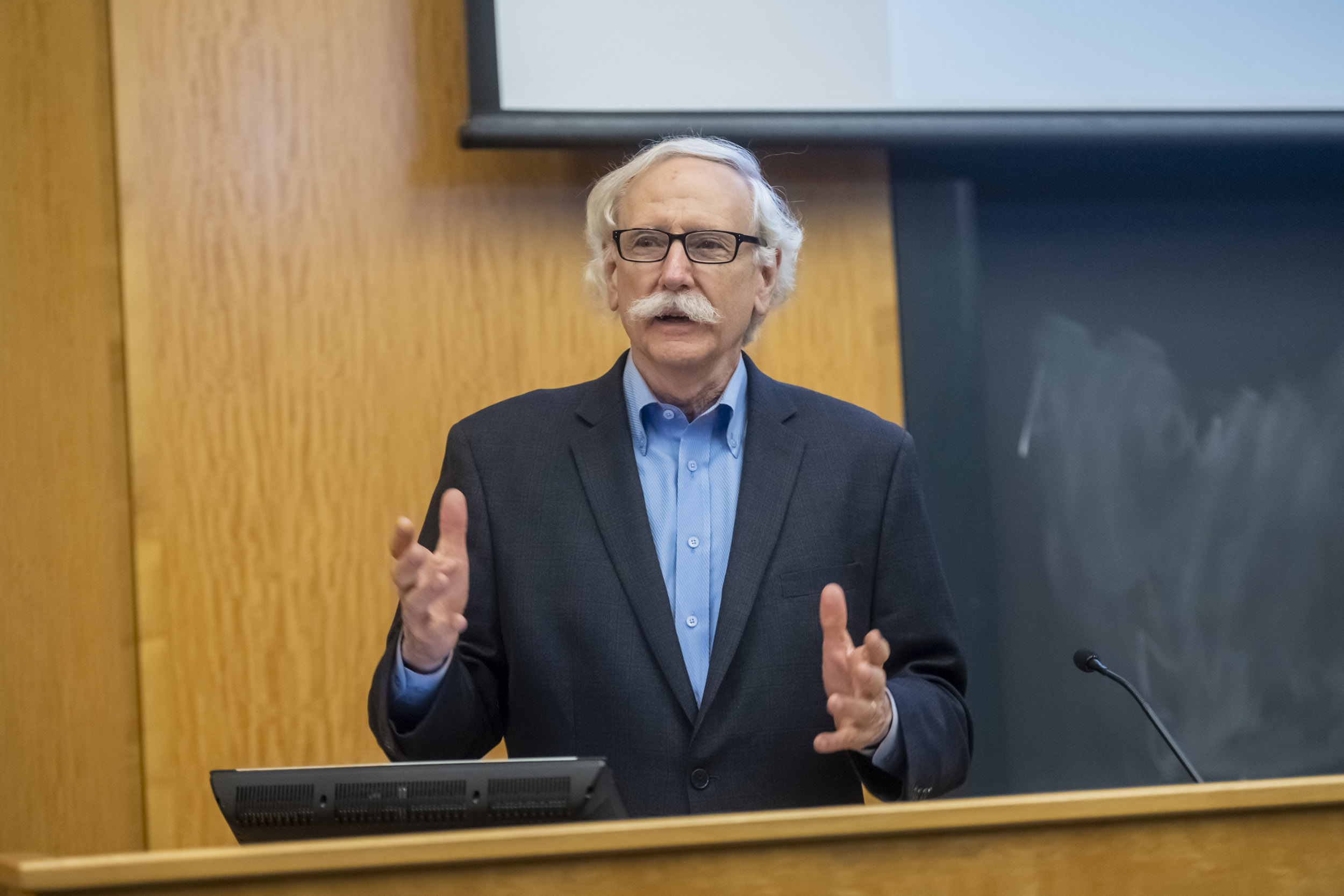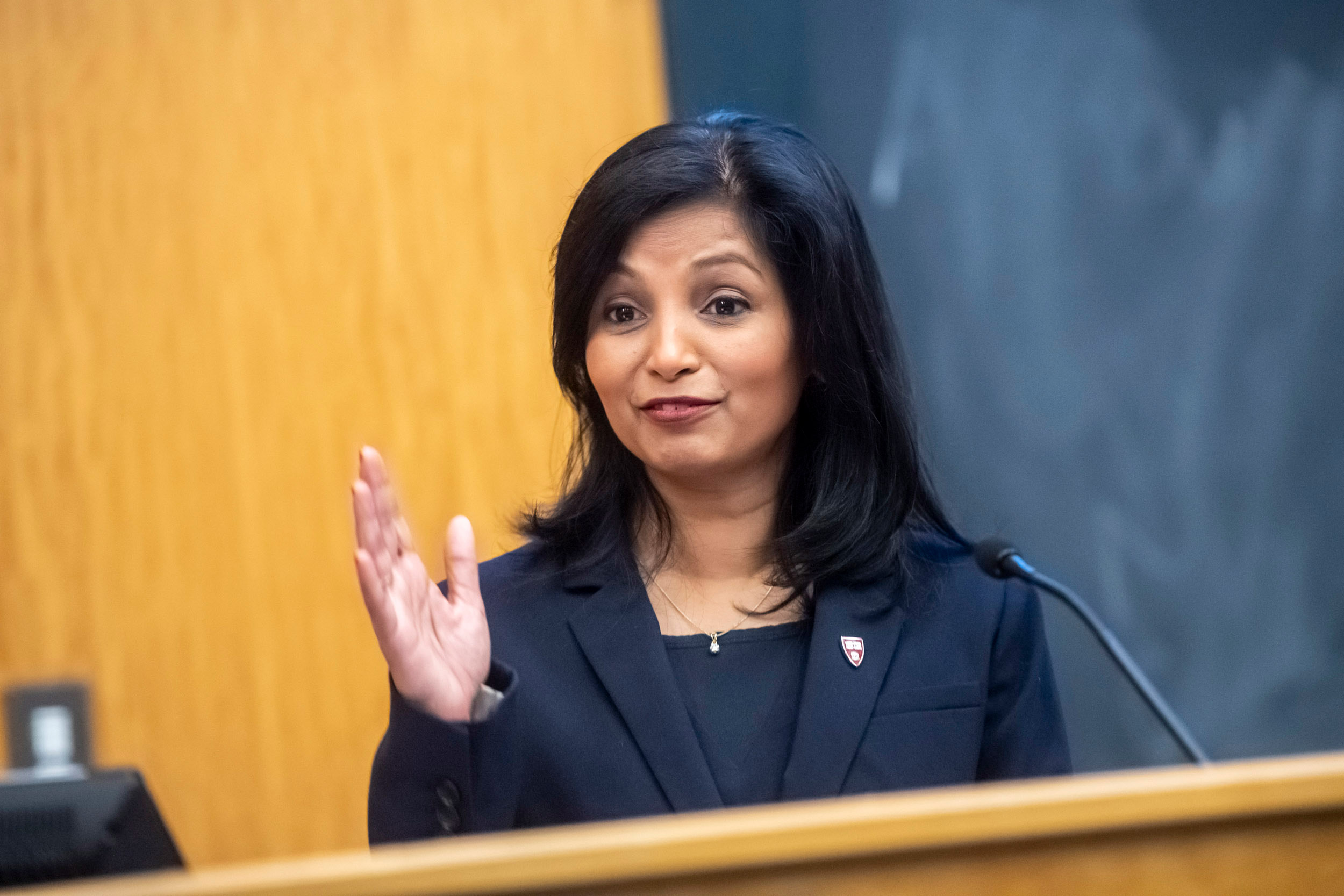
Harvard Professor Walter Willett first addressed the environmental impact of food choices, particularly those of high-income countries like the United States.
Photos by Jon Chase/Harvard Staff Photographer
Healthier options for people, planet
Harvard Food Systems Initiative connects University research with on-campus experiences, meals
Walter Willett and Smitha Haneef, co-chairs of the new Harvard Food Systems Initiative, told an audience of students and faculty on Wednesday night that eating sustainably means more than just fitting in your share of greens and it’s easier — and tastier — than most might think. And they want to prove it to Harvard students, right in their own dining halls.
Willett, a professor of epidemiology and nutrition at the Chan School of Public Health, opened the discussion, a satellite event of the White House Conference on Hunger, Nutrition, and Health, by addressing the environmental impact of food choices, particularly those of high-income countries like the United States.
“The reality is that the dominant eating culture in America has been Northern European,” said Willett, pointing to the nation’s consumption of high levels of red meat, eggs, and dairy products. “The production of meat produces the greatest amount of greenhouse gas emissions, and this is not minor. The amount [of emissions] per serving of red meat is 160 times greater than a serving of legumes like lentils or soy products. Chicken and fish are also higher, but less than 30 percent higher.”
The environmental damage caused by those kinds of diets aren’t sustainable with current growth and climate trends, he said.
In addition, such meat-heavy diets are just as unhealthy for people as they are for the planet, Willett said. Standing in front of food and nutrition charts informed by his work at on the EAT-Lancet Commission on Food, Planet, and Health, he made it clear that U.S. dietary habits are contributing to trends of rising obesity, diabetes, and heart disease.
“We are trying to make it inclusive, culturally sensitive, health-sensitive, and flavorful,” said Smitha Haneef, managing director of HUDS. “We don’t want to make it restrictive, but rather by design promote a healthy diet and sustainable food system.”

“The health implications are huge. About 42 percent of Americans at this time [are obese] … I could spend hours talking about the harmful effects of obesity, from cancer to eye disease, almost every organ in the body is adversely affected,” Willett said. “Obesity is a major risk factor for dying of COVID, [linked to] diabetes and hypertension. If we had been in better shape, we probably would have had 30-50 percent fewer COVID deaths in this country.”
The solution, said Willett, “isn’t reinventing the wheel.” It’s looking to what people have been eating for hundreds of years in places outside of Northern Europe. Low in red meat and high in fruits, vegetables, and plant protein, traditional Latin American, Asian, and Mediterranean diets are more sustainable for personal and planetary health.
While shifting national and global diets will take time, what we can do right now is think more actively about the menus that we design for our students and our community on campus, said Haneef, the managing director of Harvard University Dining Services.
“On our campus we serve about 5 million meals a year,” she said. “As the person who leads procurement of all the things that get onto those plates, what does [this research] mean for me? Where can I move markets or shape markets with the decisions that we make?”
Over the past several months, Haneef and her team have worked to create climate-friendly menus that embrace the research of scientists like Willett. She discussed a sample menu of nutrient-dense, flavorful, and locally sourced options that students can look forward to seeing on plates around the University. Many were inspired by more sustainable Mediterranean, Latin, or Asian cuisines.
“We are trying to make it inclusive, culturally sensitive, health-sensitive, and flavorful,” she said. “We don’t want to make it restrictive, but rather by design promote a healthy diet and sustainable food system.”
“I hope that HFSI will serve as a common place for knowledge exchange, knowledge generation, and community engagement.”
Smitha Haneef
The event was part of a weeklong preview of programming the initiative is planning for the coming weeks and months. Other events during the week included chef-led tours of House kitchens, pop-up cooking demonstrations, and a climate-friendly dinner with first-year students at Annenberg.
On Monday, HFSI also hosted David Nabarro, senior adviser to the United Nations on Food Systems Summit Dialogues, for a standing-room-only discussion on the future of food systems.
In an interview with the Gazette before the event, Haneef and Willett said the initiative’s goal is to bring together the networks of food-systems research that exist in various Harvard Schools and to build more awareness.
“We have enormous energy around this subject: faculty teaching courses, leading scientific research, students engaging in co-curricular and extracurricular activities, and operators innovating on a daily basis,” said Haneef. “I hope that HFSI will serve as a common place for knowledge exchange, knowledge generation, and community engagement.”
The group plans to create and distribute accessible research and learning materials. In addition to more lectures from experts like Willett, the initiative is rolling out an eight-part curriculum for people to learn about their relationship to the food system. A new piece will be added each month.
Haneef and Willett said there will be more opportunities for students to visit local farms and fisheries to see firsthand what sustainable food production looks like. But much of the group’s efforts will revolve around the dining halls.
“Virtually every student interacts with dining services every day,” said Willett. “I think there are only a handful of parts of the University where every student goes through a similar interaction on a daily basis, so this is taking advantage of that very unique opportunity.”




